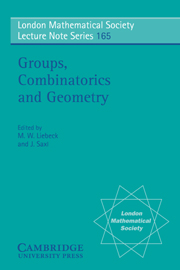Book contents
- Frontmatter
- Contents
- Authors' Addresses
- Introduction
- Part 1 Sporadic groups
- Part 2 Moonshine
- 7 The signature of the normalizes of Γ0 (N)
- 8 Completely replicahle functions
- 9 Introduction to the Monster Lie algebra
- 10 Remarks on Moonshine and Orbifolds
- Part 3 Local and geometric methods in group theory
- Part 4 Geometries and related groups
- Part 5 Finite and algebraic groups of Lie type
- Part 6 Finite permutation groups
- Part 7 Further aspects of simple groups
- Part 8 Related topics
10 - Remarks on Moonshine and Orbifolds
Published online by Cambridge University Press: 07 September 2010
- Frontmatter
- Contents
- Authors' Addresses
- Introduction
- Part 1 Sporadic groups
- Part 2 Moonshine
- 7 The signature of the normalizes of Γ0 (N)
- 8 Completely replicahle functions
- 9 Introduction to the Monster Lie algebra
- 10 Remarks on Moonshine and Orbifolds
- Part 3 Local and geometric methods in group theory
- Part 4 Geometries and related groups
- Part 5 Finite and algebraic groups of Lie type
- Part 6 Finite permutation groups
- Part 7 Further aspects of simple groups
- Part 8 Related topics
Summary
Introduction. The celebrated paper of Conway-Norton on connections between the Monster and certain modular functions opened up dramatic possibilities for the study of hitherto unrelated fields, but for a long time the foundations of this new subject remained obscure. Work of Borcherds and Frenkel-Lepowsky-Meurman showed that the origins of “moonshine” involved the theory of infinite-dimensional Lie algebras and that indeed the monster-modular connection could be understood in the context of two-dimensional conformal field theory. In an appendix to, Norton extended the Conway-Norton conjectures in a quite remarkable way. He expected that his new strengthened conjectures, as compelling as they were, were peculiar to the Monstrous situation and might help lead to an explanation of the genus zero problem. But these hopes were quickly dashed, in the sense that in I showed that, roughly speaking, one can associate modular forms to the elements of any finite group in such a way that the axioms which Norton introduced were satisfied. Shortly thereafter I learned that the ideas of Norton were just those which axiomatize certain algebraic aspects of “conformal field theory on an orbifold.”
Thus indeed Norton's ideas are susceptible to application to any finite group and it is my feeling that this approach will provide a suitable foundation to the subject of moonshine. In this note I want to discuss the notion of what I call an “elliptic system,” which is just a mild extension of Norton's ideas in, and show how it can be thought of as a simultaneous generalization of a modular form and of a “moonshine module.”
- Type
- Chapter
- Information
- Groups, Combinatorics and Geometry , pp. 108 - 120Publisher: Cambridge University PressPrint publication year: 1992
- 1
- Cited by



